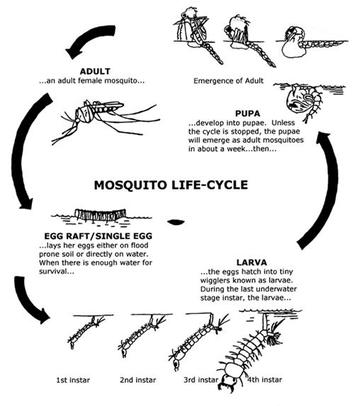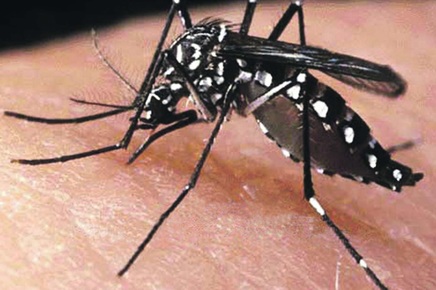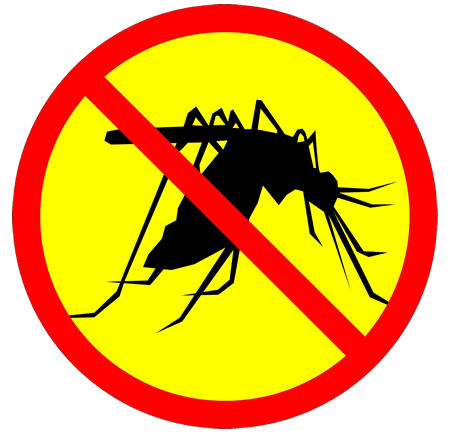Where Did The Aedes Aegypti Mosquito Originate?
What Is The Life Span of A Mosquito
The Egg
- Most mosquito will lay their eggs in water or in close proximity to water where the atmosphere is moist. The mosquito egg can take anywhere between twenty four (24) to forty eight (48) hours to hatch and move on to the larva stage.
- The larva will reside in infested water and breath through air tubes and will reside in this stage for 8-10 days until it is then moved on to the next stage which is the Pupa.
- The Pupa also resides in the water and mosquito is formed in the pupa just like a butterfly formed in the cocoon. At about 3-5 days, the mosquito will emerge from the Pupa and will stand on top of the water where it dries itself to take flight.
The Adult Mosquito
- Male mosquitoes will feed on plant nectar and its soul purpose is to fertilize the female mosquito which is the real danger as she needs blood to nourish the eggs which she will lay.
The Aedes Mosquito Characteristics?
- Aedes aegypti is a small dark mosquito with white lyre shaped markings and banded legs.
- Will mostly bite humans and prefer indoors
- They bite primarily during the day
- Most active two hours after sunrise and several hours before sunset
- The mosquito is smart and bites in places seldom caught or seen such as ankles, back of legs and elbows.
Types of Diseases Carried By The Aedes Aegypti
Dengue Fever
Dengue fever is a disease caused by a family of viruses and transmitted by mosquito bite. Some of the most common symptoms of dengue fever are, fever, pain, dehydration, swollen lymph nodes, headache and rash. The fever normally runs its full course in approximately two weeks. The most common treatment of dengue fever is to increase fluid intake, painkillers and bed rest. If the dengue fever is more severe and leads to Dengue Hemorrhagic Fever (DHF) or Dengue Shock Syndrome (DSS). In some of these cases death can occur. If a clinical diagnosis is made early, a health care provider can effectively treat DHF using fluid replacement therapy. Adequately management of DHF generally requires hospitalization.
Chikungunya
Another worrying disease carried by this famous mosquito. People who have become infected with this disease will experience fever and joint pains. Other symptoms may include muscle pain, joint swelling, or rash and headaches. There is no vaccine against this disease and the common treatment is pain killers, increase of fluid intake such as water and natural juices and paracetamols. The virus remains in the human system for 5-7 days and mosquitoes feeding on an infected person during this period can also become infected.
Yellow Fever
One of the more deadly disease transmitted by the Aedes Aegypti mosquito is the yellow fever. It is an acute viral hemorrhagic disease, meaning, fever and hemorrhage are caused by a viral infection. The yellow in the name of the disease actually refers to the jaundice which affects infected persons. Yellow fever is dangerous as over half of the severely infected persons will die from it. This disease is said to be more prolific in African nations.
Symptoms of yellow fever includes:
- Stage 1 (infection): Headache, muscle and joint aches, fever, flushing, loss of appetite, vomiting and sometimes jaundice.
- Stage 2 (remission): Fever and other symptoms go go away or reduce.
- Stage 3 (intoxication): Problems with many organs may occur, including the heart, liver, and kidney.
As with many of these diseases spread by the Aedes Mosquito, no antiviral medications have proved helpful in treating. Treatment normally is watered down to supportive care in a hospital. This care ensures that the infected individual is properly hydrated, temperature is kept moderate and the patient is monitored and any developments such as organ problems is treated as soon possible.
Zika Virus
Another baby of the Aedes Mosquito. The most common symptoms of the Zika virus are, are fever, rash, joint pain, and conjunctivitis (red eyes). There is no cure or vaccine for Zika, and treatment takes the common ground of paracetamol, painkillers, proper hydration and bed rest. There is however one grave symptom associated with mothers who have been infected with the Zika virus during pregnancy, and that is the baby may develop microcephaly. Microcephaly is abnormal smallness of the head, a congenital condition associated with incomplete brain development. The child will born with cognitive and mobile deficiencies. The Zika virus normally runs its full course in an infected person for approximately 10 days.
Zika Virus Contributes To Neurological Disorders
Scientist have also tied the Zika virus with and the autoimmune nervous disorder Guillain-Barré syndrome. As critical as microcephaly is, you need to pay special attention to this neurological disorder as it could affect you for years to come. So what are the symptoms of Guillain Barre Syndrome:
- tingling or prickly sensations in your fingers and toes.
- muscle weakness in your legs that travels to your upper body and gets worse over time.
- difficulty walking steadily.
- difficulty moving your eyes or face, talking, chewing, or swallowing.
- severe lower back pain.
There is absolutely no cure for the Zika virus and its widespread infection. The best option is to protect yourself from actually being bitten and clean up your environment to get rid of mosquitoes.
| Can You Get HIV From Aedes Aegypti Mosquito Bite? Since mosquitoes are prolific disease carriers, people often wonder if you can be infected with HIV after a mosquito bites and infected person and in return bites you. Well the answer to that is no. Here is why. The two tube system is one reason why mosquitoes are unable to transmit HIV. Only saliva is injected into humans when a mosquito bites and thus HIV positive blood that a mosquito may have previously ingested is never transmitted to other individual. | Some Best And natural Mosquito Repellent Cinnamon Oil
Greek Catnip Oil
Soybean Oil
|
Aedes Aegypti Eradication and Control
- Get rid of containers that gather water which are not needed.
- Check your homes at least once per week for anything holding water, toy, tire etc.
- Cover any needed container that may store water to prevent mosquito breeding
- If no cover is available, simple turn down the containers
- if you have dish drainers that store water, ensure that those drainers are kept dry
- Clean and change your pets water supply regularly.
- Check potted plants for any water storage
- Fill any holes such as tree holes where water may settle with soil
- Alert your neighbor about any form of water you observed being stored which may contribute to mosquito breeding.




 RSS Feed
RSS Feed
